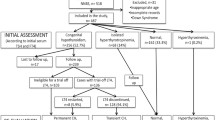Abstract
Objective
To study the factors affecting a neurodevelopmental status of children with congenital hypothyroidism, diagnosed on national screening program.
Methods
The study was performed in the Pediatric Endocrinology Department of Dr. Behcet Uz Children’s Hospital between May 2012 and May 2013. Children with congenital hypothyroidism, aged between 24 and 36 months, diagnosed by national screening program were included in the study group. Healthy subjects at the same age group consisted of the control group. For the neurodevelopmental evaluation, Bayley Scale of Infant Development- II (BSID-II) was used. Factors possibly effective on neurodevelopment were evaluated.
Results
42 patients and 40 healthy children (mean (SD) age, 29.4 (3.7) and 29.2 (3.5), respectively were included in the study. The mean MDI score [92.6 (7.07) vs 97.1 (9.69), P=0.14)] and the mean PDI score [97.8 (15.68) vs 99.1 (10.57), P=0.66)] in the study group and control group were not significantly different. Among the patient, 4.6% and 4.7% children were moderately retarded as per the MDI scores and PPI scores, respectively. The sex, socioeconomic status, birth weight, screening levels of TSH, severity of the congenital hypothyroidism, initiation time and the dosage of thyroid hormone replacement, length of the normalization period of TSH, and adherence to treatment were not found to affect the MDI and PDI scores of the patients.
Conclusion
Some children with congenital hypothyrodism may have mild to moderate neurodevelopmental retardation, despite the early diagnosis and treatment, and thus need to be under regular follow-up for neurodevelopmental status.
Similar content being viewed by others
References
Simsek E, Karabay M, Safak A, Kocabay K. Congenital hypothyroidism and iodine status in Turkey: a comparison between the data obtained from an epidemiological study in school aged children and neonatal screening for congenital hypothyroidism in Turkey. Pediatr Endocrinol Rev. 2003;1:155–61.
Buyukgebiz A. Congenital hypothyroidism clinical aspects and late consequences. Pediatr Endocrinol Rev. 2003;1:185–90.
Yordam N, Ozon A. Neonatal thyroid screening: methods, efficiency, failures. Pediatr Endocrinol Rev. 2003;1:177–84.
Komur M, Ozen S, Okuyaz C, Makharoblidze K, Erdoðan S. Neurodevelopment evaluation in children with congenital hypothyroidism by Bayley-III. Brain Dev. 2013;35:392–7.
Huo K, Zhang Z, Zhao D, Li H, Wang J, Wang X, et al. Risk factors for neurodevelopmental deficits in congenital hypothyroidism after early substitution treatment. Endocr J. 2011;58:355–61.
Bayley N. Bayley Scales of Infant Development. 2nd ed. San Antonio, TX: Psychological Corp; 1993.
Nesanir N, Eser E. Development of a socioeconomic index to be used in healthy researches in Turkey. TAF Prev Med Bull. 2010; 9:277–88.
The New England Congenital Hypothyroidism Collaborative. Elementary school performance of children with congenital hypothyroidism. J Pediatr. 1990;116:27–32.
Derksen-Lubsen G, Verkerk PH. Neuropsychologic development in early treated congenital hypothyroidism: analysis of literature data. Pediatr Res. 1996;39:561–6.
Van der Sluijs Veer L, Kempers MJ, Wiedijk BM, Last BF, Grootenhuis MA, Vulsma T. Evaluation of cognitive and motor development in toddlers with congenital hypothyroidism diagnosed by neonatal screening. J Dev Behav Pediatr. 2012;33:633–40.
Kempers MJE, van der Sluijs Veer L, Nijhuis-van der Sanden RW, Lanting CI, Kooistra L, Wiedijk BM, et al. Neonatal screening for congenital hypothyroidism in the Netherlands: Cognitive and motor outcome at 10 years of age. J Clin Endocrinol Metab. 2007;92:919–24.
Bongers-Schockking JJ, de Muinick Keizer-Schrama SM. Influence of timing and dose of thyroid hormone replacement on development in infants with congenital hypothyroidism. J Pediatr. 2000;136:292–7.
La Franchi SH, Austin J. How should we be treating children with congenital hypothyroidism. J Pediatr Endocrinol Metab. 2007;20:559–78.
Baloch Z, Carayon P, Conte-Devolx B. Laboratory medicine practice guideliness: Laboratory support for the diagnosis and monitoring of thyroid disease. Thyroid. 2003;13:3–126.
Dimitropoulos A, Molinari L, Etter K, Torresani T, Lang-Muritano M, Jenni OG. Children with congenital hypothyroidism: long-term intellectual outcome after early high-dose treatment. Pediatr Res. 2009;65:242–8.
Author information
Authors and Affiliations
Corresponding author
Rights and permissions
About this article
Cite this article
Baysal, B.T., Baysal, B., Genel, F. et al. Neurodevelopmental outcome of children with congenital hypothyroidism diagnosed in a national screening program in Turkey. Indian Pediatr 54, 381–384 (2017). https://doi.org/10.1007/s13312-017-1111-5
Received:
Revised:
Accepted:
Published:
Issue Date:
DOI: https://doi.org/10.1007/s13312-017-1111-5




